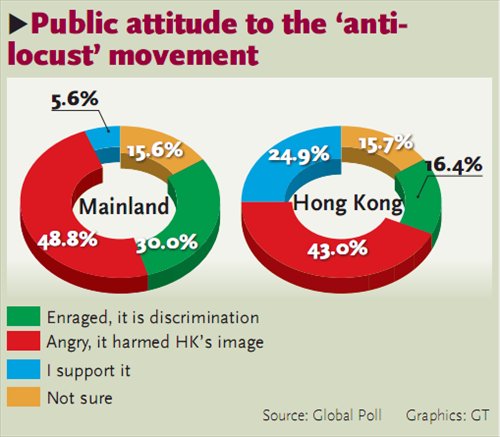HOME >> CHINA
Majority angry at HK protest: poll
By Zhang Yiwei Source:Global Times Published: 2014-2-25 1:23:01

Nearly 80 percent of respondents on the Chinese mainland and nearly 60 percent of Hong Kongers are against the "eliminating locusts" protests aimed at mainland visitors organized by some Hong Kong residents last week, according to a Global Times poll.
The survey, conducted by the Global Times Global Poll Center from Friday to Monday, collected responses from 1,209 mainland residents and 1,004 Hong Kong residents above 15 years old.
A total of 78.8 percent of mainland respondents said they were angry over a recent anti-mainlander protest, while 59.4 percent of Hong Kongers had the same feeling.
Over 200 protesters from a Hong Kong activist group gathered near Canton Road in Tsim Sha Tsui on February 16. They demanded the Hong Kong government reduce the quota for mainland visitors.
The increasing influx of these visitors - deemed "locusts" by their critics - has been taking up too many resources and disturbing local people's lives, they claimed.
"Only a few Hong Kongers will take an aggressive approach. Most of them are against it due to cultural factors and blood relationship," said Zhu Shihai, a professor specializing in Hong Kong studies from the Central Institute of Socialism.
Chang Chak-yan, a professor with the Chinese University of Hong Kong, agreed, saying that most Hong Kongers have moderate manners and advocate the prosperous development of Hong Kong.
Nearly 60 percent of both mainlanders and Hong Kongers believe that the current tensions are mainly caused by bad manners displayed by some mainland visitors in Hong Kong. Other reasons include mainlanders flocking into Hong Kong to buy infant formula, raising house prices by speculative investment, and mainland children studying in Hong Kong, with some 50 percent of mainlanders and 70 percent of Hong Kongers believing these are factors.
Zhu said it is feasible for the mainland to take measures if Hong Kong puts greater pressure on reducing the number of mainland visitors.
"We should respect Hong Kong's wishes, as an excessive number of visitors has already caused discontent there. Mainlanders should pay attention to it by negotiation and communication," he said.
Developing under the "one country, two systems" principle, some opposition activists have launched a "Hong Kong independence" campaign, which requests "total autonomy."
Over 90 percent of mainland respondents opposed this campaign, while Hong Kong residents revealed a more complicated attitude, with 41.5 percent saying no, 31.7 percent supporting the idea, and 26.9 percent expressing no firm opinion.
Mainland and Hong Kong residents also share different views over the development of "one country, two systems." About 38 percent of mainland respondents hope to see a balanced improvement on both aspects, while 36 percent value "one country" as a basic premise.
Meanwhile, over half of Hong Kong respondents consider that the difference in political systems should be strengthened, while 26 percent believe the government should push forward both aspects.
Many Hong Kongers know that independence for Hong Kong is impossible, Zhu said, a view echoed by Chang.
"Some Hong Kongers may deliberately exaggerate the issue to attract attention and gain more resources," Zhu said.
Both experts said that the difference between Hong Kong and mainland residents' mentality over political systems is understandable. Hong Kong tends to emphasize its capitalist system and its residents are against the intervention from the mainland.
"But the current tension mainly remains at the level of conflict of interests and is barely connected with the political system," Zhu said.
More than 70 percent of mainlanders and over 50 percent of Hong Kongers think that enhancing communication between the mainland and Hong Kong is the most effective way to reduce tension.
Posted in: Politics